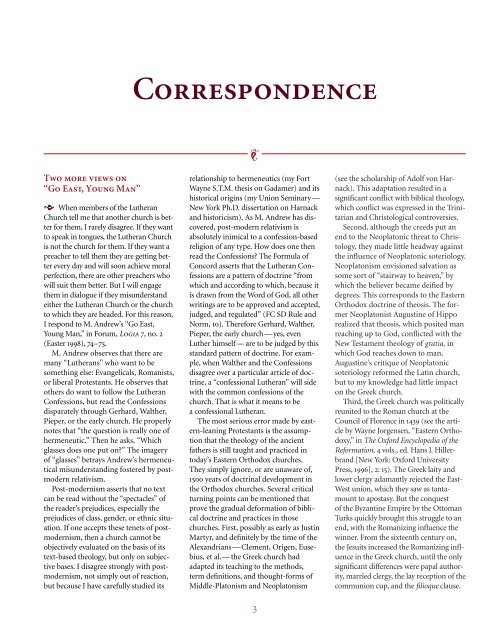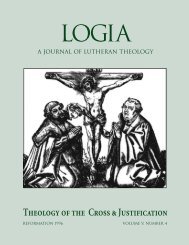Create successful ePaper yourself
Turn your PDF publications into a flip-book with our unique Google optimized e-Paper software.
Two more views on<br />
“Go East, Young Man”<br />
�<br />
When members <strong>of</strong> <strong>the</strong> Lu<strong>the</strong>ran<br />
Church tell me that ano<strong>the</strong>r church is better<br />
for <strong>the</strong>m, I rarely disagree. If <strong>the</strong>y want<br />
to speak in tongues, <strong>the</strong> Lu<strong>the</strong>ran Church<br />
is not <strong>the</strong> church for <strong>the</strong>m. If <strong>the</strong>y want a<br />
preacher to tell <strong>the</strong>m <strong>the</strong>y are getting better<br />
every day and will soon achieve moral<br />
perfection, <strong>the</strong>re are o<strong>the</strong>r preachers who<br />
will suit <strong>the</strong>m better. But I will engage<br />
<strong>the</strong>m in dialogue if <strong>the</strong>y misunderstand<br />
ei<strong>the</strong>r <strong>the</strong> Lu<strong>the</strong>ran Church or <strong>the</strong> church<br />
to which <strong>the</strong>y are headed. For this reason,<br />
I respond to M. Andrew’s “Go East,<br />
Young Man,” in Forum, Logia 7, no. 2<br />
(Easter 1998), 74–75.<br />
M. Andrew observes that <strong>the</strong>re are<br />
many “Lu<strong>the</strong>rans” who want to be<br />
something else: Evangelicals, Romanists,<br />
or liberal Protestants. He observes that<br />
o<strong>the</strong>rs do want to follow <strong>the</strong> Lu<strong>the</strong>ran<br />
Confessions, but read <strong>the</strong> Confessions<br />
disparately through Gerhard, Wal<strong>the</strong>r,<br />
Pieper, or <strong>the</strong> early church. He properly<br />
notes that “<strong>the</strong> question is really one <strong>of</strong><br />
hermeneutic.” Then he asks, “Which<br />
glasses does one put on?” The imagery<br />
<strong>of</strong> “glasses” betrays Andrew’s hermeneutical<br />
misunderstanding fostered by postmodern<br />
relativism.<br />
Post-modernism asserts that no text<br />
can be read without <strong>the</strong> “spectacles” <strong>of</strong><br />
<strong>the</strong> reader’s prejudices, especially <strong>the</strong><br />
prejudices <strong>of</strong> class, gender, or ethnic situation.<br />
If one accepts <strong>the</strong>se tenets <strong>of</strong> postmodernism,<br />
<strong>the</strong>n a church cannot be<br />
objectively evaluated on <strong>the</strong> basis <strong>of</strong> its<br />
text-based <strong>the</strong>ology, but only on subjective<br />
bases. I disagree strongly with postmodernism,<br />
not simply out <strong>of</strong> reaction,<br />
but because I have carefully studied its<br />
Correspondence<br />
�<br />
relationship to hermeneutics (my Fort<br />
Wayne S.T.M. <strong>the</strong>sis on Gadamer) and its<br />
historical origins (my Union Seminary —<br />
New York Ph.D. dissertation on Harnack<br />
and historicism). As M. Andrew has discovered,<br />
post-modern relativism is<br />
absolutely inimical to a confession-based<br />
religion <strong>of</strong> any type. How does one <strong>the</strong>n<br />
read <strong>the</strong> Confessions? The Formula <strong>of</strong><br />
Concord asserts that <strong>the</strong> Lu<strong>the</strong>ran Confessions<br />
are a pattern <strong>of</strong> doctrine “from<br />
which and according to which, because it<br />
is drawn from <strong>the</strong> Word <strong>of</strong> God, all o<strong>the</strong>r<br />
writings are to be approved and accepted,<br />
judged, and regulated” (FC SD Rule and<br />
Norm, 10). Therefore Gerhard, Wal<strong>the</strong>r,<br />
Pieper, <strong>the</strong> early church —yes, even<br />
Lu<strong>the</strong>r himself— are to be judged by this<br />
standard pattern <strong>of</strong> doctrine. For example,<br />
when Wal<strong>the</strong>r and <strong>the</strong> Confessions<br />
disagree over a particular article <strong>of</strong> doctrine,<br />
a “confessional Lu<strong>the</strong>ran” will side<br />
with <strong>the</strong> common confessions <strong>of</strong> <strong>the</strong><br />
church. That is what it means to be<br />
a confessional Lu<strong>the</strong>ran.<br />
The most serious error made by eastern-leaning<br />
Protestants is <strong>the</strong> assumption<br />
that <strong>the</strong> <strong>the</strong>ology <strong>of</strong> <strong>the</strong> ancient<br />
fa<strong>the</strong>rs is still taught and practiced in<br />
today’s Eastern Orthodox churches.<br />
They simply ignore, or are unaware <strong>of</strong>,<br />
1500 years <strong>of</strong> doctrinal development in<br />
<strong>the</strong> Orthodox churches. Several critical<br />
turning points can be mentioned that<br />
prove <strong>the</strong> gradual deformation <strong>of</strong> biblical<br />
doctrine and practices in those<br />
churches. First, possibly as early as Justin<br />
Martyr, and deWnitely by <strong>the</strong> time <strong>of</strong> <strong>the</strong><br />
Alexandrians — Clement, Origen, Eusebius,<br />
et al.— <strong>the</strong> Greek church had<br />
adapted its teaching to <strong>the</strong> methods,<br />
term deWnitions, and thought-forms <strong>of</strong><br />
Middle-Platonism and Neoplatonism<br />
3<br />
(see <strong>the</strong> scholarship <strong>of</strong> Adolf von Harnack).<br />
This adaptation resulted in a<br />
signiWcant conXict with biblical <strong>the</strong>ology,<br />
which conXict was expressed in <strong>the</strong> Trinitarian<br />
and Christological controversies.<br />
Second, although <strong>the</strong> creeds put an<br />
end to <strong>the</strong> Neoplatonic threat to Christology,<br />
<strong>the</strong>y made little headway against<br />
<strong>the</strong> inXuence <strong>of</strong> Neoplatonic soteriology.<br />
Neoplatonism envisioned salvation as<br />
some sort <strong>of</strong> “stairway to heaven,” by<br />
which <strong>the</strong> believer became deiWed by<br />
degrees. This corresponds to <strong>the</strong> Eastern<br />
Orthodox doctrine <strong>of</strong> <strong>the</strong>osis. The former<br />
Neoplatonist Augustine <strong>of</strong> Hippo<br />
realized that <strong>the</strong>osis, which posited man<br />
reaching up to God, conXicted with <strong>the</strong><br />
New Testament <strong>the</strong>ology <strong>of</strong> gratia, in<br />
which God reaches down to man.<br />
Augustine’s critique <strong>of</strong> Neoplatonic<br />
soteriology reformed <strong>the</strong> Latin church,<br />
but to my knowledge had little impact<br />
on <strong>the</strong> Greek church.<br />
Third, <strong>the</strong> Greek church was politically<br />
reunited to <strong>the</strong> Roman church at <strong>the</strong><br />
Council <strong>of</strong> Florence in 1439 (see <strong>the</strong> article<br />
by Wayne Jorgensen, “Eastern Orthodoxy,”<br />
in The Oxford Encyclopedia <strong>of</strong> <strong>the</strong><br />
Reformation, 4 vols., ed. Hans J. Hillerbrand<br />
[New York: Oxford University<br />
Press, 1996], 2: 15). The Greek laity and<br />
lower clergy adamantly rejected <strong>the</strong> East-<br />
West union, which <strong>the</strong>y saw as tantamount<br />
to apostasy. But <strong>the</strong> conquest<br />
<strong>of</strong> <strong>the</strong> Byzantine Empire by <strong>the</strong> Ottoman<br />
Turks quickly brought this struggle to an<br />
end, with <strong>the</strong> Romanizing inXuence <strong>the</strong><br />
winner. From <strong>the</strong> sixteenth century on,<br />
<strong>the</strong> Jesuits increased <strong>the</strong> Romanizing inXuence<br />
in <strong>the</strong> Greek church, until <strong>the</strong> only<br />
signiWcant diVerences were papal authority,<br />
married clergy, <strong>the</strong> lay reception <strong>of</strong> <strong>the</strong><br />
communion cup, and <strong>the</strong> Wlioque clause.

















